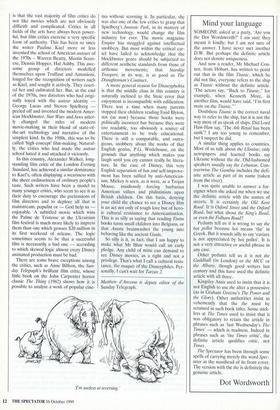Mind your language
SOMEONE asked at a party, 'Are you
the Dot Wordsworth?' I am sure they meant it kindly; but I am not sure of the answer. I have never met another D.W. But perhaps the definite article does not denote uniqueness.
And now a reader, Mr Michael Con- nor, from Hobart, has written to point
out that in the film Titanic, which he did not like, everyone refers to the ship as Titanic without the definite article.
'The actors say, "Back to Titanic," for example, when Kenneth More, in another film, would have said, "I'm first mate on the Titanic."
Doubtless Titanic is the correct naval way to refer to the ship, but it is not the way most of us speak of ships. Did Lord Haw-Haw say, 'The Ark Royal has been sunk'? I am too young to remember, but I suspect he did.
A similar thing applies to countries. Most of us talk about the Ukraine; only
newspapers and learned books say
Ukraine without the the. Old-fashioned speakers usually say the Lebanon. Con-
trariwise The Gambia includes the defi- nite article as part of its name (taken from the river).
I was quite unable to answer a for- eigner when she asked me when we use the definite article with the names of streets. It is certainly the Old Kent Road. It is Oxford Street and the Oxford Road, but what about the King's Road, or even the Fulham Road?
Pedants tell us it is wrong to say the hoi polloi because hoi means 'the' in
Greek. But it sounds silly to say 'caviare is not appreciated by hoi polloi'. It is not a very attractive or useful phrase in any case.
Other pedants tell us it is not the Guildhall (in London) or the MCC or the Albany, though good writers last century and this have used the definite article with all three.
Kingsley Amis used to insist that it is not English to use the after a possessive (as in Graham Greene's The Power and the Glory). Other authorities insist as vehemently that the the must be retained in such book titles. Some stick- lers at The Times used to insist that it was obligatory to retain the article in phrases such as 'last Wednesday's The Times' — which is madness. Indeed in phrases such as 'the Times critic', the definite article qualifies critic, not Times.
The Spectator has been through some spells of carrying merely the word Spec-
tator at the masthead of its front cover. The version with the the is definitely the genuine article.
Dot Wordsworth


















































































 Previous page
Previous page